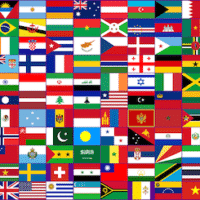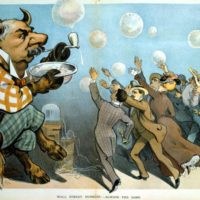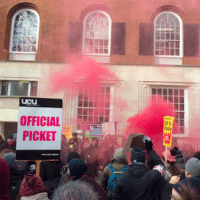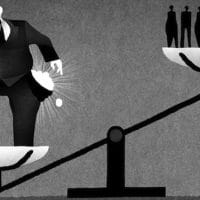-
An alternative to liberal globalization
In the Bandung Conference of 1955, the governments and peoples of Asia and Africa expressed their ambitions to reconstruct a global system based on the recognition of the rights of countries that had previously been under the yoke of colonialism. In that period, “the rights to development,” as applied to the frameworks for negotiating multipolarity constituted the basis of globalization. These rights would force the imperial powers to adapt to new realities.
-
Notebook #2: The Rate of Exploitation
The rate of exploitation in the production of Apple’s iPhone X, which stands at 2458%, is 25 times the rate of exploitation that is gleaned from Marx’s examples in Capital, published in 1867.
-
Education Dept says Middle East Studies program has to advance the security interests of the United States in order to receive further funding
The U.S. Department of Education has determined the Duke-University of North Carolina Consortium for Middle East Studies misused Title VI funds and they’re requiring the program to provide a revised list of activities that will use these funds over the coming year.
-
Top 1% up $21 Trillion. Bottom 50% down $900 Billion.
The insights of this new data series are many, but for this post here I want to highlight a single eye-popping statistic. Between 1989 and 2018, the top 1 percent increased its total net worth by $21 trillion. The bottom 50 percent actually saw its net worth decrease by $900 billion over the same period.
-
There must be bones under the paved street
On 6 August 1945, the United States military dropped a bomb that contained 64kg of uranium-235 over the city of Hiroshima (Japan). The bomb took just over 44 seconds to fall from 9,400 metres and detonated 580 metres above the Shima Surgical Clinic. Over 80,000 people died instantly. This was the first use of the nuclear bomb.
-
Inflation & the Politics of Pricing with Nathan Tankus
In this episode, we talk with Nathan Tankus, Research Director of the Modern Money Network, and Research Fellow at the Clarke Business Law Institute at Cornell Law School. We ask Nathan to expand upon and deepen his engagement with the inflation question in all its historical, political, and rhetorical complexity.
-
98.3 percent of Ghana’s gold remains in the hands of multinational corporations
Disproportionate focus on corruption of national leaders distracts from the systemic theft of Ghana’s wealth.
-
Lots of noise from Trump but nothing changed for U.S. multinational corporations
Bank of France: “Six small jurisdictions (Bermuda, Ireland, Luxembourg, the Netherlands, Singapore and Switzerland), which count for less than 1 percent of the world’s population, hold 63 percent of the overall profits earned abroad by U.S. multinationals.”
-
International Institutional Monopoly Capitalism and Its Manifestations
Monopoly capitalism emerged from “laissez-faire” capitalism in the late nineteenth and early twentieth centuries, allowing giant corporations to dominate the accumulation process.
-
U.S. public school teachers: declining pay, growing militancy
Strikes continue to be an effective way for teachers to improve their living and working (and by extension student learning) conditions. And, polls show that a strong majority of parents continue to support them. Popular support for teacher strikes remains strong The education pollster PDK recently asked adults what they thought about teacher salaries and […]
-
Russiagate is a ruling class diversion
So this is what we can look forward to in the long twilight of a shrinking U.S. empire: the shrieks of a delirious ruling class, concocting endless diversions from the central reality of late-stage capitalism’s inability to offer the people anything but widening wars and deepening austerity.
-
June 2018: reflections on 1988 three decades later
Capitalism as a system functions irrationally because social and ecological concerns cannot be taken into account when making business decisions. Profits before all else.
-
University strikes: where do we go from here?
On February 22nd the University and College Union (UCU) called for the beginning of a nation wide strike in response to Universities UK’s (UUK) attempt to shift of the Universities Superannuation Scheme from a defined benefit pension to a defined contribution pension.
-
Under the cover of philanthropy: a monopoly machine at work
The long-term costs of allowing a handful of corporations to take over healthcare and agriculture in developing countries, in exchange for vaccinations and hybrid seeds sold at discounted price, will be paid by populations in the Global South once the process of monopolization is complete.
-
NYT joins campaign to purge the term, “white monopoly capital” in South Africa
The New York Times, the world’s premier journalistic purveyor of a “fake,” imperial, and profoundly white capitalist world view — masquerading as all the news that’s fit to print — wants us to believe that a now-bankrupt London-based public relations firm is behind South Africa’s regime-shaking debate over the rule of “white monopoly capital.”
-
The Billionaire boom: 82% of global wealth produced last year went to richest 1%
Forida is a 22-year-old sewing machine operator in a clothing factory in Dahka, Bangladesh. She often works 12-hour days producing clothes for brands such as H&M and Target. Sometimes, during busy production cycles, the hours are even longer.
-
Making merry on bitcoin
Bitcoin has left the world of finance gasping. Although the total market value of all that cryptocurrency in circulation is only a fraction of the value of the world’s financial assets, the rapid rise in the value of the currency has made it the most wanted of those assets. On January 1, 2017, the currency was trading between $972 and $990 a unit. By December 7, it was trading between $14,063 and $17,363.
-
Economic warfare in Venezuela
Given the thick haze of disinformation surrounding the economic situation in Venezuela, we thought it would be useful to publish the first chapter of The Visible Hand of the Market: Economic Warfare in Venezuela.
-
Dimensions of economic power: today’s key corporations
The images below are from a lecture I gave to at SOAS, London University, on 18 October. This was part of a series organised by the SOAS Economics Department, and my lecture covered the forms taken by corporate power today, focusing on Apple, Google/Alphabet, Facebook, Amazon and Alibaba.
-
Top ten percent now own 77% of the wealth
The Federal Reserve released the 2016 version of the Survey of Consumer Finances today. I will be doing a lot of work with this data in the coming months. But for starters, here is a short post about overall wealth inequality.




















